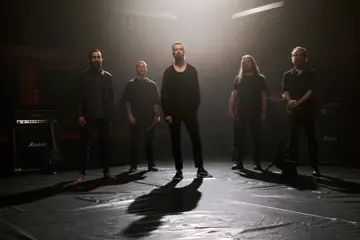 Steve Smyth
Steve SmythAs he walks in with his well worn – but well loved – guitar, you get the feeling Steve Smyth wouldn’t often have said instrument far from his reach. Not so much a security blanket, but maybe something familiar wherever he is.
There’s something old school about him. Smyth is the artisan singer-songwriter. The stories he tells speak of the joy he finds in music, and the effect on himself and others. He’s still smiling at the fact he’s only just returned from touring Europe to find a record company gearing for his second album Exits. “It can be a steep learning curve, but yeah – I’ve got a bloody good job,” he considers.
It’s an appreciation of what he’s got. And accepting a responsibility in it: “It’s the sheer enjoyment of doing it. I want a longevity, I want to be doing this ‘til I’m an old man – to the best of my ability – and hoping I’ll know if it starts to decay, I’ll just piss off.”
Perhaps it comes down to people just putting you on the right path. Cue wobbly focus flashback sequence – the teenage kid from the south coast of NSW, getting up to sing at the local pub (“If there wasn’t a fight on a Friday night, you’d wonder what was wrong”), but still doing the real world carpentry apprenticeship. And by chance, knocking on a door looking for a place to plug the tools in and finding Jack Lowry, recently arrived from Oregon, who wandered out when the boys were on a smoko, “with this gorgeous old Gibson guitar, and he just played and chatted – and I just couldn’t believe such beauty could come out of a piece of wood”, as Smyth now explains it.
“He became a mentor to me. I’d grab my guitar – yeah, that one – and go round with a 2L bottle of Coke, his clubbing days were over – and watch the sun go down. Playing tunes, and he just gave me the music – and the history lesson as well.”
The dots were joined. “I’d find Tom Waits – so Jack would take me through Screaming Jay Hawkins, Sun Ra, Howling Wolf. I was like ‘What the fuck is this, and where do I get more?’ But I was the same about hearing Edith Piaf or Debussy or Louis Armstrong. Once you find that something – that tone – you want to find the lines to and from all of those people. And take different things from it.” Some of those extremes of music come through on Exits, as Smyth aims for “going from raw – harsh, even – to something tender, but having that thread of me to hold it together”.
Mr Lowry even provided some tough love. “He’d be honest with me. I’d be writing these really naff teenage songs – which I thought were the greatest thing ever – and he’d just calm me down. Point to the page and go ‘What’s that line, what does that really mean to you?’ He’d call me on it: ‘That doesn’t convince me – and you don’t believe it either.’ Just that honesty, that’s hopefully made me better at my craft. Your responsibility is to get the most power out of your instrument, whatever that is – guitar, the writing, whatever.”
Flash forward to connecting with history in another way, recording Exits in the Hollywood Hills with the fearsomely credentialed Joey Waronker (Beck and R.E.M. drummer, producer of Eels and Lisa Germano) and Gus Seyffert (Ryan Adams, Norah Jones). Was Smyth after a distance, a new environment from ‘home’? “Maybe partly that,” he ponders. “I was actually deterred a bit. I thought about all that history, and being a bit starry-eyed about the idea of LA, as much as the actual place.”
“But once the boys showed me their city, it became something a bit different, real. But still with some of the myths built into it. We’d finish a track, and roll down the road to The Satellite, and see The Zombies, then they’d introduce me to the bass player from The Kinks. And I’m trying to be all cool about it but thinking, ‘Fuck! That’s really him!’” He grins from beneath that now-trademark beard.
Steve Smyth can still find the wonder, the magic. “There are times your songs are out of your hands, and just surprise you where they turn up,” he muses. “Like the letter from a guy in America – just came out of a coma, and the first thing he’s listening to and really comprehending is my record. I mean, how do you answer that? That’s outside the industry, that’s outside my experience.” He is genuinely moved. “We all have records that have saved our life – but that’s something else again. Flooring, humbling. But good times, man. Bloody good times.”















